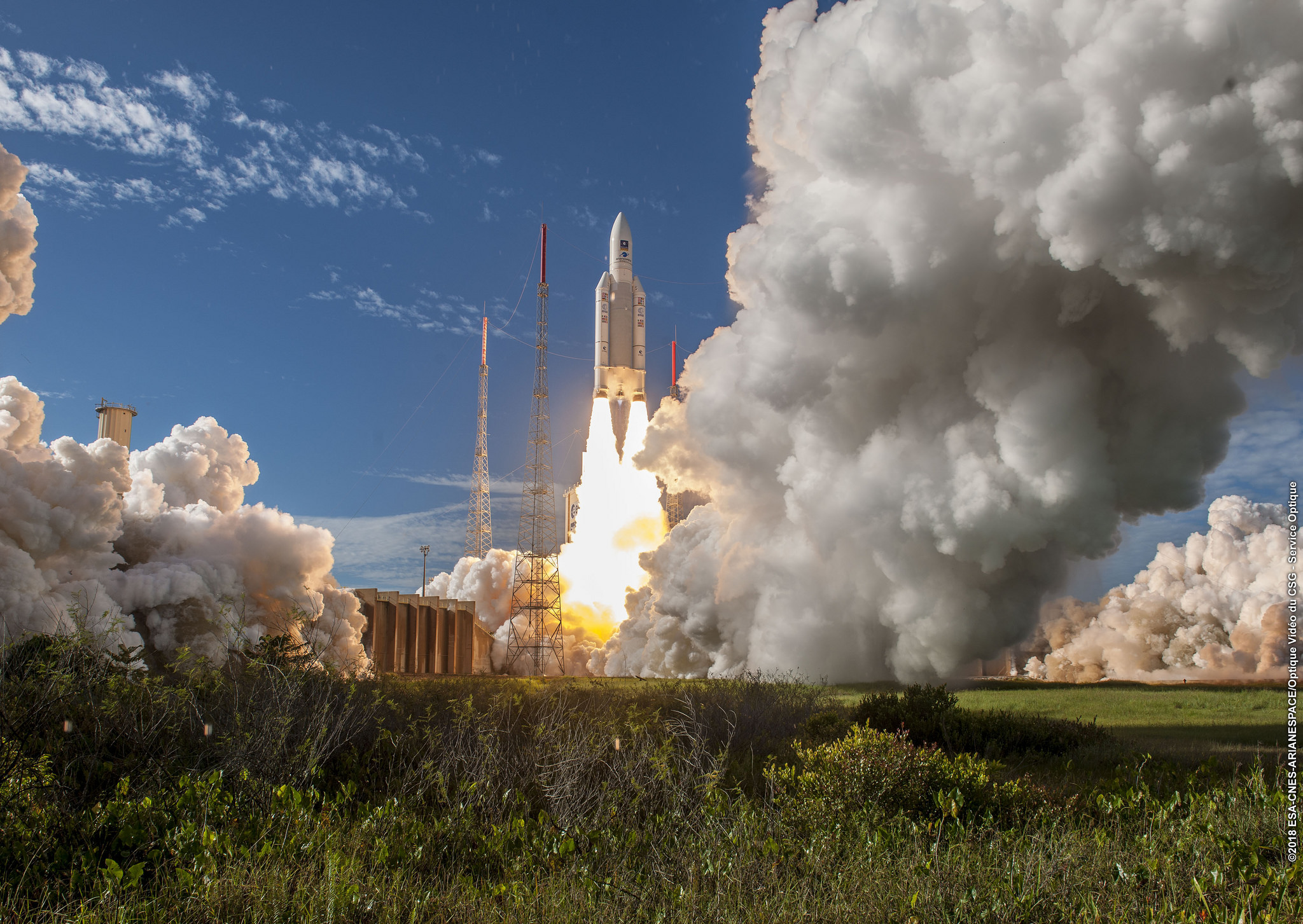Ariane 5 Rocket Launches 4 Navigation Satellites for Europe
An Ariane 5 rocket launched four European navigation satellites into orbit today (July 25), bringing the total number of satellites in Europe's Galileo navigation system up to 26.
The two-stage rocket, built by the European launch provider Arianespace, lifted off from the Guiana Space Center in Kourou, French Guiana, at 7:25 a.m. EDT (1125 GMT, 8:25 a.m. local time).
A few minutes later, the rocket's two solid boosters separated and fell into the Pacific Ocean off the coast of Peru, and the payload fairing jettisoned from the rocket's second stage. [The Most Exciting Space Missions to Watch in 2018]

After the rocket's core stage separated, the second-stage engines ignited, kicking off a 3-hour coast into medium Earth orbit, where the satellites were deployed at an altitude of 14,243 miles (22,922 kilometers) shortly after 11 a.m. EDT (1500 GMT).
These four satellites will join the 22 Galileo satellites already in orbit. The Galileo constellation, which will eventually consist of 30 satellites, has provided Europe with a high-precision navigation system — similar to the U.S.'s Global Positioning System (GPS) — since it became operational in 2017.
With its own GPS satellite network, Europe is ending its reliance on Russia's GLONASS navigation system and the U.S. Air Force's Navstar GPS satellites, European Space Agency officials said in a statement. Unlike those networks, Europe's independent system is made for and operated by civilians. Its lower-precision navigation services are free for anyone to use, and private companies can purchase higher-precision capabilities.
Today's mission was the third and final time that an Ariane 5 rocket has been used to launch Galileo satellites. With the next launch, in 2020, the new Ariane 6 rocket will take over and will start launching pairs of Galileo satellites. The Ariane 6 rocket will replace the Ariane 5, and the Ariane 5 ES configuration of the rocket that flew today has officially been retired.
Get the Space.com Newsletter
Breaking space news, the latest updates on rocket launches, skywatching events and more!
"The Ariane 6's A62 version will take over, with two launches used to orbit another four satellites during a timeframe between December 2020 and June 2021," according to Arianespace's description of today's launch.
Arianespace has launched all of the Galileo satellites that are currently in orbit, starting with the first test satellite, launched in 2005. Before the Ariane 5 started launching them in 2016, Arianespace Soyuz rockets launched the first Galileo satellites into orbit.
Email Hanneke Weitering at hweitering@space.com or follow her @hannekescience. Follow us @Spacedotcom, Facebook and Google+. Original article on Space.com.
Join our Space Forums to keep talking space on the latest missions, night sky and more! And if you have a news tip, correction or comment, let us know at: community@space.com.

Hanneke Weitering is a multimedia journalist in the Pacific Northwest reporting on the future of aviation at FutureFlight.aero and Aviation International News and was previously the Editor for Spaceflight and Astronomy news here at Space.com. As an editor with over 10 years of experience in science journalism she has previously written for Scholastic Classroom Magazines, MedPage Today and The Joint Institute for Computational Sciences at Oak Ridge National Laboratory. After studying physics at the University of Tennessee in her hometown of Knoxville, she earned her graduate degree in Science, Health and Environmental Reporting (SHERP) from New York University. Hanneke joined the Space.com team in 2016 as a staff writer and producer, covering topics including spaceflight and astronomy. She currently lives in Seattle, home of the Space Needle, with her cat and two snakes. In her spare time, Hanneke enjoys exploring the Rocky Mountains, basking in nature and looking for dark skies to gaze at the cosmos.









